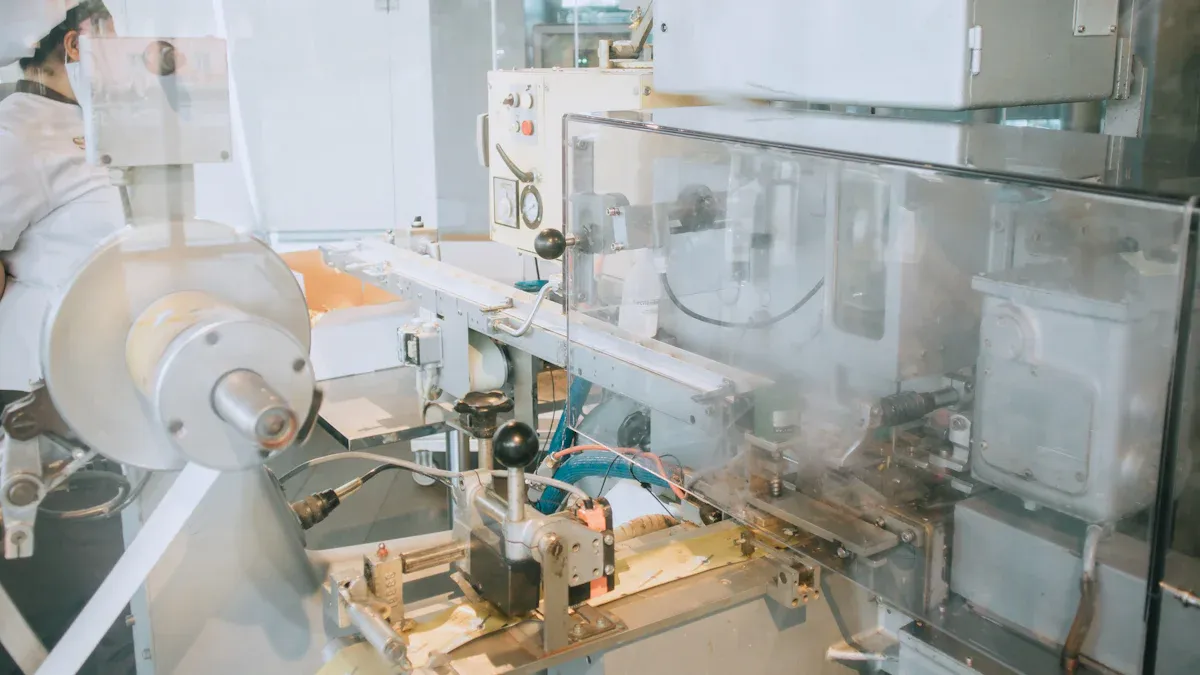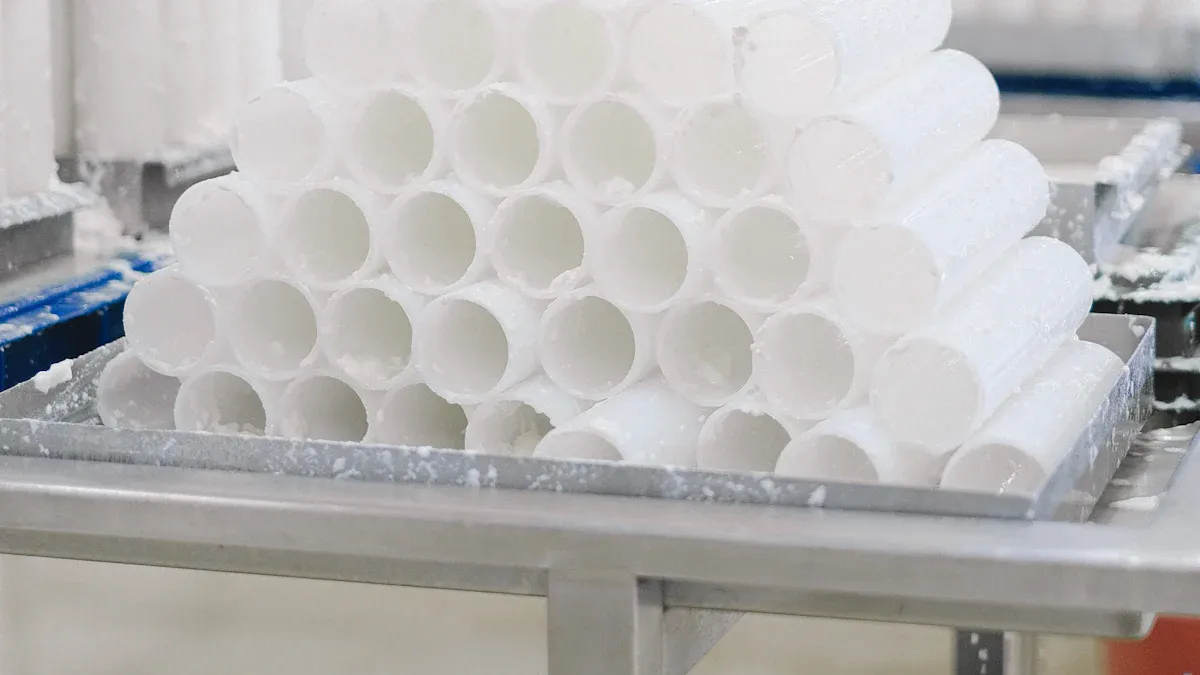
Selecting the right vet injection molding partner in 2025 is more critical than ever. Industry trends show a sharp rise in sustainability requirements. For example, 68% of manufacturing professionals now prioritize third-party sustainability certifications—a jump from 42% in 2020. Advancements in technologies like in-mold electronics (IME) also reshape expectations, with forecasts highlighting their growing applications in automotive, medical, and home controls. You must evaluate manufacturers not only for production capabilities but also for their alignment with evolving market demands and sustainability goals.
When evaluating a vet injection molding manufacturer, you must first assess their production capacity and scalability. A manufacturer with sufficient capacity ensures they can handle your current production volume and adapt to future growth. According to the Federal Reserve Board, the industrial production index for plastics products has shown consistent growth, with a 3% annual increase in productivity. This trend highlights the importance of selecting a partner capable of scaling operations to meet rising demand.
Scalability also depends on the manufacturer’s ability to invest in advanced equipment and technology. For instance, manufacturers with modern plastic injection molding machines can achieve higher efficiency and precision, reducing downtime and defects. Look for partners who maintain a capacity utilization rate above 74%, as this indicates they can manage high production volumes without compromising quality.
Material expertise is critical when selecting a manufacturer for custom injection molding. The right partner should demonstrate proficiency in working with a wide range of materials, including thermoplastics, elastomers, and biodegradable options. This expertise ensures they can produce custom injection molded parts that meet your specific requirements.
Case studies illustrate how material expertise drives success. For example:
- Smartphone Housing: Using ABS and in-mold decoration (IMD) techniques, manufacturers achieved a high-quality finish, boosting market appeal.
- Medical Device Components: Employing medical-grade polycarbonate ensured biocompatibility and precision, meeting stringent regulatory standards.
- Sustainable Packaging: Developing biodegradable packaging with PLA reduced environmental impact while maintaining cost-effectiveness.
A manufacturer with diverse material knowledge can also advise you on the best options for durability, cost, and sustainability. This versatility allows you to adapt to market demands without significant investment in new processes.
Quality assurance is non-negotiable when vetting injection molding manufacturers. High-quality standards reduce defects, improve customer satisfaction, and enhance profitability. Look for manufacturers with robust quality control systems, such as real-time monitoring and statistical process control (SPC). For example, the Polymar Quality Assurance Laboratory uses advanced mechanical and optical inspection equipment to ensure consistent quality.
Certifications are another key indicator of a manufacturer’s commitment to quality. Reputable manufacturers often hold certifications like ISO 9001:2015 or UL Recognized Component Molder (RCM). These credentials demonstrate compliance with international standards and industry best practices.
Here’s a quick overview of essential quality control metrics:
| Quality Control Metrics | Description |
|---|---|
| Low cost of materials | Efficient resource management. |
| Low cost of production | Reflects operational efficiency. |
| Low defect rate | Signifies high product reliability. |
| High-quality yield | Demonstrates successful production outcomes. |
| Zero industry violations | Ensures compliance with safety and quality standards. |
By prioritizing manufacturers with strong quality assurance processes and certifications, you can minimize risks and ensure the reliability of your custom injection molded parts.

Energy efficiency and sustainability have become essential in modern injection molding processes. Manufacturers now prioritize reducing energy consumption and waste to meet environmental standards and lower operational costs. You can see this shift in the development of biodegradable plastics and recycled polymers, which allow for eco-friendly production without compromising quality. Additionally, energy-efficient machinery has emerged as a game-changer, offering reduced power usage and optimized performance.
To achieve sustainability, manufacturers adopt several strategies:
- Use of energy- and water-efficient equipment.
- Optimization of cooling, heating, and cycle times.
- Implementation of closed-loop recycling systems to minimize waste.
- Prioritization of renewable energy sources like solar or wind.
Recent advancements in automation and AI also play a critical role. Predictive maintenance techniques, powered by IoT data, forecast potential failures. This allows timely interventions, reducing downtime and ensuring efficient energy use. By choosing a manufacturer that integrates these technologies, you can align your production goals with sustainability objectives.
Precision and automation define the future of injection molding machines. Advanced technologies like smart hot runner systems and AI-driven automation enhance machine quality and production efficiency. These systems use real-time monitoring and advanced sensors to optimize flow, reduce setup costs, and ensure consistent quality.
Here’s a closer look at how these technologies benefit manufacturers:
| Study Focus | Key Features | Benefits |
|---|---|---|
| Smart Hotrunner System | Autonomous sequencing, real-time monitoring | Reduces setup costs, ensures consistent quality |
| AI Integration | Machine learning, natural language processing | Enhances efficiency, reduces human error |
| Hot Runner and Control Systems | Support for Bio-Resins and PCR materials | Drives efficiency in diverse applications |
AI technologies also automate processes, adapting to changing demands with minimal human intervention. For example, robotic systems now program themselves automatically, while intelligent malfunction detection ensures smooth operations. Machines equipped with self-optimization capabilities continuously learn and improve, making them indispensable for high-volume production.
The integration of IoT in injection molding machines has revolutionized the industry. IoT-enabled systems monitor and optimize the molding process in real time, ensuring maximum efficiency. These smart systems connect production equipment and ancillary systems, enabling seamless communication and energy optimization across the entire manufacturing process.
One standout feature of IoT integration is smart automation. This technology uses AI-driven systems to analyze data, predict maintenance needs, and adjust settings for optimal performance. For instance, IoT sensors track machine quality metrics like temperature, pressure, and cycle times, ensuring consistent results. By leveraging IoT, you can achieve higher precision, reduce waste, and improve overall equipment efficiency.
| Feature | Description |
|---|---|
| Smart Automation | Integration of IoT and AI-driven systems to monitor and optimize the molding process in real-time. |
IoT also enhances transparency by providing detailed insights into production metrics. This allows you to make data-driven decisions, improving both quality and productivity. As a result, manufacturers that embrace IoT stand out as leaders in innovation and efficiency.
Understanding pricing transparency is essential when selecting a manufacturer for custom injection molding. Transparent pricing ensures you know exactly what you are paying for, from design and materials to machining and testing. However, hidden costs can inflate your budget unexpectedly. These may include post-production modifications, maintenance charges, or secondary processes like packaging and transport.
To avoid surprises, evaluate all cost components, such as:
- Raw materials
- Injection molding processes
- Secondary processes
- Packaging and transport
- Personnel expenses
Labor costs, energy consumption, and management expenses also contribute significantly to the total cost. For example, wages for machine operators and maintenance personnel, along with electricity and water usage, directly impact production costs. By ensuring clear communication with your manufacturer, you can identify and mitigate these hidden expenses.
Balancing upfront costs with long-term ROI is critical for sustainable operations. While initial investments in custom injection molding may seem high, they often lead to significant savings over time. Tools like the Plastic Injection Molding Excel proforma can help you forecast production costs, perform break-even analysis, and project revenue. These financial models allow you to determine the sales point that covers all costs, ensuring profitability.
For example, investing in high-quality equipment may increase upfront costs but reduce defects and maintenance expenses in the long run. Financial forecasting and cash flow analysis also provide insights into long-term ROI, helping you make informed decisions about capital expenditures. By focusing on these factors, you can achieve a balance between initial investment and future returns.
When comparing quotes, consider more than just the price. Look at the value-added services offered by each manufacturer. These services may include design assistance, prototyping, or post-production support, which can enhance the quality of your custom injection molded parts.
To evaluate quotes effectively:
1. Assess part quantity and its impact on cost.
2. Examine tooling variables, such as one- or multi-cavity tools.
3. Verify the materials used for tool construction, as they affect both cost and quality.
A thorough comparison helps you identify manufacturers who provide high-quality parts while meeting your production volume requirements. By focusing on value-added services, you can ensure your investment delivers maximum returns.
Certifications play a vital role in evaluating a supplier's credibility. They demonstrate adherence to industry standards and commitment to delivering high-quality parts. For instance, certifications like ISO 9001:2015 and AS9100 are benchmarks for quality assurance. The AS9100 certification, widely recognized in the aviation sector, enhances a supplier's reliability. Studies show that 80% of aviation buyers prioritize suppliers with strong certification records. This highlights how certifications foster trust and long-term partnerships.
Compliance with environmental and safety regulations also reflects a supplier's dedication to responsible manufacturing. Look for manufacturers who meet sustainability standards and maintain workplace safety. These factors not only ensure quality but also align with modern market demands.
After-sales service is a critical factor when assessing supplier reputation and expertise. A reliable supplier provides prompt technical support and effective problem-solving services. The speed of response to customer needs often determines the quality of support. For example, manufacturers with dedicated support teams can quickly address equipment issues, minimizing downtime.
Effective technical support also includes training for your team, regular maintenance, and access to spare parts. These services ensure smooth operations and extend the lifespan of your equipment. By choosing a supplier with robust after-sales support, you can reduce operational risks and enhance productivity.
Customer reviews and case studies offer valuable insights into a supplier's performance. Positive reviews often highlight factors like product expertise, reliable service, and consistent quality. For example, a case study revealed a 30% revenue increase for a company due to effective supplier support. This success was attributed to the supplier's ability to deliver high-quality parts and provide exceptional service.
When researching reviews, focus on metrics like customer satisfaction and retention rates. These indicators reflect the supplier's ability to meet client expectations. Additionally, case studies showcasing market opportunities validate the supplier's expertise and reliability. By analyzing these resources, you can make an informed decision about your manufacturing partner.

Effective communication is essential when working with an injection molding machine manufacturer. Poor communication can lead to misunderstandings, project delays, and increased costs. You should evaluate how quickly a supplier responds to inquiries and whether they provide clear and concise information. Delayed responses or miscommunication often signal deeper issues within the organization.
| Aspect | Important Factors | Red Flags |
|---|---|---|
| Response Time | Within 24 hours | Delayed responses |
| Technical Support | Engineering team availability | Limited technical knowledge |
| Language Skills | Clear communication | Miscommunication issues |
| Project Management | Dedicated project manager | No single point of contact |
A supplier with poor communication may lack a dedicated project manager or technical support team. This can result in confusion and inefficiencies, ultimately affecting your production efficiency and delivery times. Always prioritize manufacturers who demonstrate strong communication skills and a commitment to customer service.
Inconsistent quality or delays in deliveries can disrupt your operations and damage your reputation. Manufacturers without advanced quality management systems (QMS) often struggle to maintain consistent standards. Real-time monitoring and standardized processes are critical for ensuring high-quality production and on-time delivery.
When evaluating a manufacturer, ask about their quality assurance processes and how they handle unexpected delays. A reliable supplier will have systems in place to minimize disruptions and maintain consistent quality.
Limited customization options or outdated technology can hinder your ability to meet specific production needs. Modern injection molding machines offer features like customized screw designs, heater bands, and control retrofits. These upgrades improve performance, reduce downtime, and enhance production efficiency.
| Evidence Type | Description |
|---|---|
| Machinery Upgrades | Enhances efficiency and reduces downtime. |
| Customization Options | Improves performance and material handling. |
| Control Retrofits | Reduces cycle times and improves production quality. |
| IIoT Solutions | Identifies inefficiencies and maximizes operational effectiveness. |
Manufacturers who fail to invest in modern technology may struggle to meet your volume requirements or adapt to changing market demands. Look for partners who leverage IIoT solutions and other innovations to stay competitive and deliver high-quality results.
Evaluating injection molding manufacturers in 2025 requires a strategic approach. You should focus on key factors like production capacity, material expertise, and quality assurance. Consider the intended use of your product, as manufacturers often specialize in specific designs and materials. Look for value-added services, such as mold flow analysis, to enhance part quality.
Technological advancements like Manufacturing Execution Systems (MES) improve operational efficiency and provide real-time visibility. These tools enable data-driven decisions, ensuring competitiveness in a dynamic market. By prioritizing quality, innovation, and reputation, you can select a partner who aligns with your goals and delivers consistent results.
The most important factor is their ability to meet your specific product application needs. Evaluate their expertise, technology, and ability to deliver quality and on-time deliveries. This ensures your production goals align with their capabilities.
Choose manufacturers with advanced quality control systems. Look for certifications like ISO 9001:2015 and ask about their quality assurance processes. High-volume molders often use real-time monitoring to maintain consistent quality and on-time delivery times.
Material expertise ensures the manufacturer can handle diverse materials for your custom injection molded parts. This is essential for achieving durability, precision, and sustainability in your products. It also helps you adapt to market demands without additional costs.
Technological advancements improve efficiency, precision, and sustainability. Modern injection molding machines integrate IoT and automation, reducing waste and enhancing production. These innovations make it easier to produce high-quality parts for various industries.
High-volume molders offer scalability and efficiency. They use advanced injection molding machines to handle large production runs while maintaining quality. This reduces costs and ensures your products meet market demands.